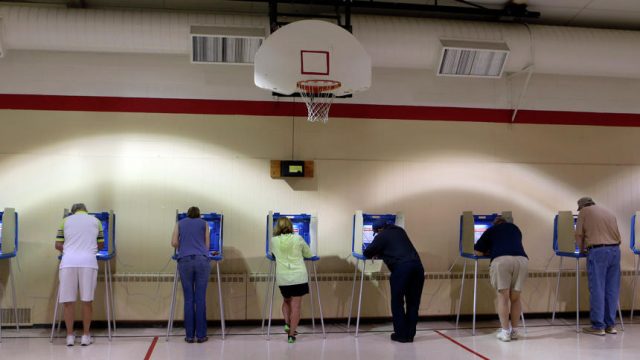Senator Nicole Poolman: Setting the Facts Straight About Voter ID in North Dakota

Voters at Holy Family Catholic Church in Grand Forks fill out their ballots early Tuesday for the North Dakota primary election. photo by Eric Hylden/Grand Forks Herald
This guest post was submitted by Republican state Senator Nicole Poolman, Chair of Senate Government and Veterans Affairs Committee and cosponsor of HB 1369.
After watching inaccurate national news coverage surrounding North Dakota’s voter identification law, I felt compelled to set the record straight on the legislative process and intent behind the voter ID bill.
Some have claimed that we had no problems with voter fraud in North Dakota, but the reality was we had many people voting without providing proof of district residency. Under our old system, someone could simply sign an affidavit saying they lived at a certain address. Over 5,000 of these affidavits were used in Cass County alone, and 40 percent of those were unaccounted for. In a county where some elections were decided by as few as 37 votes, this 40 percent certainly determined the outcome of several races. The legislature wanted to provide integrity to our elections, so we developed another fail-safe process to cast your vote.
When you go to the polls on November 6, you’ll need one of the following:
- a driver’s license,
- a nondriver’s ID (free for those over 18), or
- a tribal ID (also free).
If that ID doesn’t have your current physical address on it, don’t worry – you’ll want to grab a utility bill; a bank statement; a paycheck; or a government issued document, letter, or check with your address on it.
If you forget any of these items, you can still vote. The poll workers will simply put your ballot in an envelope, and you can come back to the polls later that day to provide the identification, or get it to the county auditor’s office within six days of the election. Once the identification is provided, the vote is counted.
[mks_pullquote align=”right” width=”300″ size=”24″ bg_color=”#ffffff” txt_color=”#000000″]If one looks at the minutes of our committee hearings, they will see that not a single Native American testified against this bill in committee, and no one mentioned any issue relating to addresses on the reservation. [/mks_pullquote]
Some news outlets have claimed the reason for our law is to disenfranchise Native American voters. Nothing could be further from the truth. If one looks at the minutes of our committee hearings, they will see that not a single Native American testified against this bill in committee, and no one mentioned any issue relating to addresses on the reservation. In fact, my good friend and the only Native American in the legislature serves on my committee. He passed around his tribal ID and explained that these IDs have all the necessary information and are provided to tribal members free of charge. He subsequently voted for this bill: in our committee, on the Senate floor, and in conference committee.
Although the media coverage has been inaccurate, it has served two important purposes. It has motivated Native Americans to go to the polls, and it has engaged tribal governments in ensuring members have everything they need to do so. As I write this letter, state and tribal government officials continue to work together to ensure voters have proper identification on Election Day.
We may continue to have differing opinions on the importance of voter identification at the polls, but requiring an ID is not unreasonable. Countries all over the world: Mexico, Greece, France, India, Belgium, and Spain – just to name a few – require photo identification to vote. Our decision to require it in North Dakota was not to change the outcomes of elections, but to protect the integrity of those outcomes.




